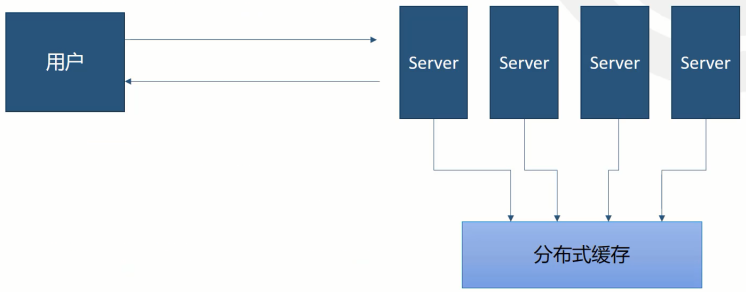缓存简介
缓存的优点:
- 提高网站的访问速度
- 适用于不易改变的数据
缓存的缺点:
- 仔细规划
- 奇怪的副作用
缓存的地点:
- 服务器(单服务器)
- 缓存服务器(多服务器)
- 客户端
In-Memory 缓存
- 最简单的
- IMemoryCache
- 适用于 Sticky Session(粘滞的会话)
- 适用于任何类型的对象
Sticky Session:In-Memory 缓存存储在 Web 服务器的内存中,只有本服务器能访问到。当 Web 应用部署在多服务器时,需保证用户访问的服务器就是之前进行缓存的服务器。
通过 services.AddMemoryCache(); 在 Startup ConfigureServices 中启用内存缓存。
MemoryCacheEntryOptions:
- Absolute expiration time 绝对过期时间
- Sliding expiration time:每次请求访问缓存后,都会重置缓存的过期时间
- 缓存优先级
- PostEvictionDelegate:缓存数据被清除时调用该委托
在 AlbumController 中使用 In-Memory Cache:
// GET: Album public async Task<ActionResult> Index() { if (!_memoryCache.TryGetValue( CacheEntryConstants.AlbumsOfToday, out List<Album> cachedAlbums)) { cachedAlbums = await _albumService.GetAllAsync(); var cacheEntryOptions = new MemoryCacheEntryOptions() .SetSlidingExpiration(TimeSpan.FromSeconds(30)); cacheEntryOptions.RegisterPostEvictionCallback(FillCache, this); _memoryCache.Set(CacheEntryConstants.AlbumsOfToday, cachedAlbums, cacheEntryOptions); } return View(cachedAlbums); } private void FillCache(object key, object value, EvictionReason reason, object state) { // 不具体实现 Console.WriteLine("Cache entry is evicted!"); }
Cache Tag Helper
格式:
<cache>@await Component.InvokeAsync("xxx")</cache>
- 服务器端
- 实际使用 IMemoryCache,也要求 Sticky Session
属性:
- enabled
- expires-on:绝对过期时间
- expires-after
- expires-sliding
- vary-by-header:如果请求的 header 变了,缓存就需要刷新
- vary-by-query
- vary-by-route
- vary-by-cookie
- vary-by-user
- vary-by
- priority
示例:
<cache expires-after="@TimeSpan.FromSeconds(30)"> @await Component.InvokeAsync("InternetStatus") </cache>
分布式缓存
特点:
- 无需 Sticky Session
- 可扩展
- Web 服务器重启不会影响缓存
- 性能更好
接口与常用方法:
- IDistributedCache
- Get, GetAsync
- Set, SetAsync
- Refresh, RefreshAsync
- Remove, RemoveAsync
类型:
- 分布式 Memory Cache(仅适合开发时使用)
- 分布式 Sql Server Cache
- 分布式 Redis Cache(推荐)
Redis Cache
通过 Docker 安装 Redis:docker pull redis
如果拉取速度很慢,推荐使用阿里云的镜像加速器(简单教程)。
运行容器:docker run --name my-redis -d -p 6379:6379 redis
命名 暴露端口 6379 镜像名
docker ps 查看运行状态:
docker run -it --link my-redis:my-redis --rm redis redis-cli -h my-redis -p 6379
- -it:interactive
- --link my-redis:链接到 my-redis
- :my-redis:在里面的名也叫 my-redis
- --rm:容器停止后就删除容器
- redis:镜像是 redis
- redis-cli:运行里面的 redis-cli 程序
- -h my-redis:hostname 叫 my-redis
- -p 6379:端口 6379
测试 redis:
打开 NuGet 安装 Redis:
在 Startup 中配置 Redis:
services.AddDistributedRedisCache(options => { options.Configuration = "localhost"; options.InstanceName = "redis-for-albums"; });
在 AlbumController 中使用 Redis:
private readonly ILogger<AlbumController> _logger; private readonly IDistributedCache _distributedCache; private readonly IAlbumService _albumService; private readonly HtmlEncoder _htmlEncoder; public AlbumController( IAlbumService albumService, HtmlEncoder htmlEncoder, ILogger<AlbumController> logger, IDistributedCache distributedCache) { _albumService = albumService; _htmlEncoder = htmlEncoder; _logger = logger; _distributedCache = distributedCache; } // GET: Album public async Task<ActionResult> Index() { List<Album> cachedAlbums; var cachedAlbumsString = _distributedCache.Get(CacheEntryConstants.AlbumsOfToday); if (cachedAlbumsString == null) { cachedAlbums = await _albumService.GetAllAsync(); var serializedString = JsonConvert.SerializeObject(cachedAlbums); byte[] encodedAlbums = Encoding.UTF8.GetBytes(serializedString); var cacheEntryOptions = new DistributedCacheEntryOptions() .SetSlidingExpiration(TimeSpan.FromSeconds(30)); _distributedCache.Set(CacheEntryConstants.AlbumsOfToday, encodedAlbums, cacheEntryOptions); } else { byte[] encodedAlbums = _distributedCache.Get(CacheEntryConstants.AlbumsOfToday); var serializedString = Encoding.UTF8.GetString(encodedAlbums); cachedAlbums = JsonConvert.DeserializeObject<List<Album>>(serializedString); } return View(cachedAlbums); }
Response 缓存
- 基于 Header
- 客户端缓存
- 使用 ResponseCache Attribute
参数:
- Location
- Duration
- NoStore
- VaryByHeader
在配置 MVC 中间件时配置 Response 缓存:
services.AddMvc(options => { options.Filters.Add(new AutoValidateAntiforgeryTokenAttribute()); options.Filters.Add<LogResourceFilter>(); options.CacheProfiles.Add("Default",new CacheProfile { Duration = 60 }); options.CacheProfiles.Add("Never", new CacheProfile { Location = ResponseCacheLocation.None, NoStore = true }); });
Response 缓存的使用:
// 手动配置 [ResponseCache(Duration = 30, Location = ResponseCacheLocation.Client)] public IActionResult Index() { _logger.LogInformation(MyLogEventIds.HomePage, "Visiting Home Index ..."); return View(); } // 通过指定 CacheProfile 进行配置 [ResponseCache(CacheProfileName = "Default")] public IActionResult Privacy() { return View(); }
注:
- 必须使用非 VS 调试启动的浏览器打开页面才能测试 Response 缓存效果
- 刷新页面时 Response 缓存不会起效
- Response 缓存中间件的相关内容请参考官方文档
压缩
压缩传输的数据。通常针对 1K 以上的数据。
services.AddResponseCompression();//注册压缩服务
app.UseResponseCompression();
详细内容参考官方文档:Response compression in ASP.NET Core。





